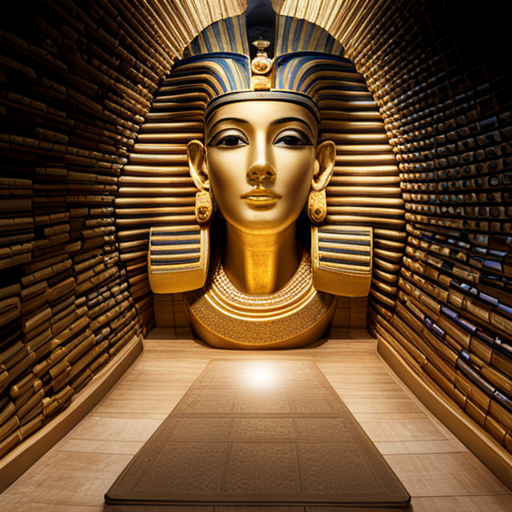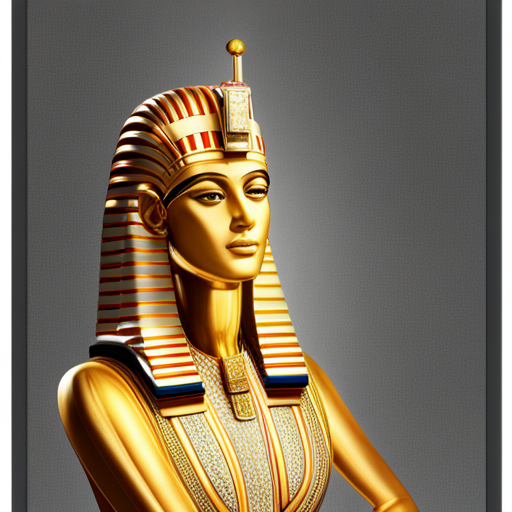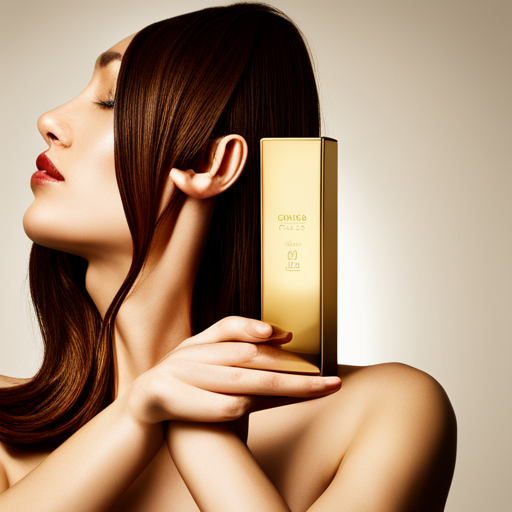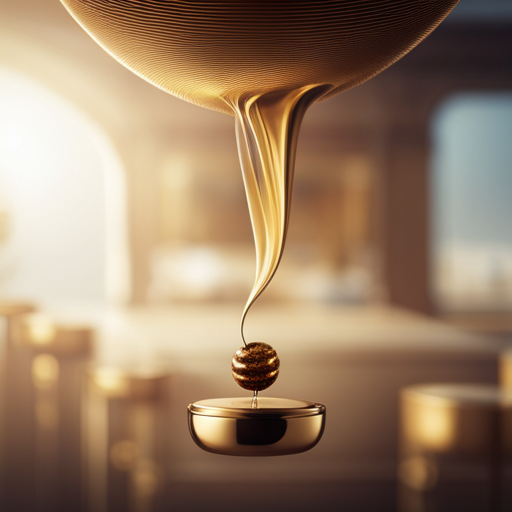The allure and mystery surrounding gold’s aroma have made it a symbol of wealth, power, and refinement throughout history. In art and literature, gold’s scent has been metaphorically used to represent beauty, desire, and mythical elements.
Today, the fascination with gold’s fragrance has led to its incorporation in luxury perfumes and products.
Key Takeaways
– Gold is an inert element and its molecular structure prevents it from reacting with other substances to create a smell.
– Gold’s lack of smell is attributed to its resistance to corrosion and oxidation, as well as its inability to absorb odors from the environment.
– Descriptions of gold’s scent include earthy notes, metallic tones, and sweet aromas.
– Gold’s aroma has cultural and historical significance, symbolizing wealth, power, and refinement. It has been used metaphorically in art and literature and continues to fascinate people today.
The Scientific Explanation Behind Gold’s Odor

https://www.youtube.com/watch?v=wqJGNsWHBF4
Scientists explain that gold doesn’t have a scent due to its inert nature and molecular structure. Being an inert element on the periodic table, gold does not react with other elements to produce a scent. Its molecular structure prevents it from reacting with other substances to create a smell.
Gold’s resistance to corrosion and oxidation is also attributed to its molecular arrangement. Furthermore, gold’s lack of smell is attributed to its inability to absorb odors from the environment.
Despite its lack of scent, gold remains a highly valued and sought-after precious metal, admired for its beauty and durability. Its inert nature also suggests potential antiseptic properties.
While gold may not have a scent of its own, its allure and significance in various aspects of human life continue to fascinate and inspire.
The Properties of Gold That Prevent It From Having a Scent

Gold’s lack of scent is attributed to its inert nature and molecular structure, which prevent it from reacting with other substances to produce an odor. The properties of gold that contribute to its odorless nature are as follows:
1. Inert Element: Gold is an inert element on the periodic table, meaning it doesn’t react with other elements to produce a scent.
2. Molecular Structure: Gold’s molecular structure prevents it from reacting with other substances to create a smell.
3. Resistance to Corrosion and Oxidation: Gold’s lack of smell is also attributed to its resistance to corrosion and oxidation, which is a result of its molecular arrangement.
4. Inability to Absorb Odors: Gold is unable to absorb odors from the environment, further contributing to its odorless nature.
These properties make gold unique among elements, and its lack of scent adds to its allure and mystery.
Descriptions of Gold’s Aroma: Earthy Notes

With a hint of grassiness and a slight muskiness, the earthy notes of gold’s scent evoke a connection to nature. Despite being an inert element on the periodic table, gold has a distinct aroma, albeit subtle and elusive.
Descriptions of its smell often include the musty scent of dirt and a slight muskiness, reminiscent of the earth’s natural fragrances. The earthy tones of gold’s scent contribute to its allure and have been a source of fascination for centuries.
Whether it is the association with wealth and luxury or the symbolic representation of beauty and desire, the earthy notes of gold’s fragrance continue to captivate and intrigue individuals to this day.
Descriptions of Gold’s Aroma: Metallic Tones

The metallic tones of gold’s scent are often described as sharp, cool, and bright, reminiscent of iron, steel, and polished brassware. The distinct aroma of gold captivates and intrigues, evoking images of strength and durability. Here are four key characteristics of gold’s metallic scent:
1. Sharpness: The scent of gold has a piercing quality, similar to the sharpness of iron or steel. It cuts through the air, leaving a lasting impression.
2. Coolness: Gold’s aroma carries a cool and refreshing quality, akin to the sensation of holding coins in your pocket. It brings a sense of calmness and serenity.
3. Brightness: The scent of gold is bright and vibrant, like the shine of polished brassware. It exudes a sense of luxury and elegance.
4. Unforgettable: Once experienced, the metallic tones of gold’s scent linger in the memory, leaving a lasting impression of richness and opulence.
Descriptions of Gold’s Aroma: Sweet Aromas

Hints of honey and caramel mingle with notes of buttercream and vanilla in the alluring fragrance of gold, invoking a warmth reminiscent of cinnamon rolls baking in the oven. This sweet aroma adds to the mystique and allure of the precious metal. The table below showcases some of the descriptions of gold’s sweet aromas:
| Sweet Aromas |
|---|
| Hints of honey |
| Notes of caramel |
| Buttercream |
| Vanilla |
| Warmth reminiscent of cinnamon rolls baking in the oven |
These delightful scents enhance the luxuriousness and exclusivity associated with gold. They evoke feelings of comfort and indulgence, making gold’s fragrance highly sought after in the beauty industry and high-end luxury products. The sweet aromas of gold also hold cultural and historical significance, symbolizing hope and dreams, and inspiring artists and writers to create works of art and literature. The enduring fascination with gold’s aroma continues to captivate and intrigue people today, adding to its timeless appeal.
The Cultural Significance of Gold’s Fragrance

Indulging in the enchanting fragrance of gold evokes a sense of cultural significance and symbolizes hope, dreams, and the pursuit of luxury and refinement.
1. Gold has a long history as a symbol of wealth and power, making its aroma highly valued in various cultures.
2. The scent of gold represents exclusivity and opulence, reminding us of the finer things in life.
3. Gold’s fragrance holds a nostalgic charm, connecting us to past generations and their aspirations for success.
4. The alluring aroma of gold has inspired artists and writers, who use it as a metaphor for beauty and desire.
Gold’s scent continues to fascinate and captivate people today, with gold-infused fragrances and perfumes gaining popularity in the beauty industry. Its mysterious allure and cultural significance contribute to its enduring appeal, making it a coveted element in the world of scent.
The Historical Significance of Gold’s Aroma

Experts throughout history have marveled at the historical significance of the captivating fragrance emitted by the precious metal known as gold.
From ancient civilizations to modern times, the aroma of gold has held a special allure. In the ancient world, gold was seen as a symbol of power and wealth, and its scent was thought to be a divine gift. It was believed that the fragrance of gold could bring good fortune and protection.
Today, while gold itself is odorless, its association with luxury and prosperity continues to intrigue and fascinate. Perfumers and artisans have attempted to capture the essence of gold’s aroma, creating fragrances that evoke the opulence and elegance that this precious metal represents.
Through the ages, the historical significance of gold’s scent has remained a source of wonder and inspiration.
Gold’s Scent in Art and Literature

The allure of gold’s fragrance has inspired countless works of art and literature throughout history. Artists and writers have often used gold’s fragrance as a metaphor for beauty and desire. The scent of gold has been depicted in paintings and described in poetry. It is frequently used symbolically to represent wealth and success.
Gold’s fragrance is often associated with mythical and magical elements in literature. The mystery and allure of gold’s scent continue to captivate and intrigue people today. Gold-infused fragrances and perfumes have gained popularity in the beauty industry. The fragrance of gold is often used in high-end luxury products.
Gold’s aroma is sought after by collectors and enthusiasts. The enduring appeal of gold’s scent is a testament to its timeless and captivating nature.
The Modern-Day Fascination With Gold’s Aroma

People today are captivated by the modern-day fascination with the captivating and enduring appeal of gold’s scent. The fragrance of gold continues to intrigue and attract people from all walks of life.
In the beauty industry, gold-infused fragrances and perfumes have gained immense popularity. High-end luxury products often incorporate the aroma of gold to create a sense of elegance and exclusivity. Collectors and enthusiasts actively seek out products that possess the mysterious scent of gold.
Its allure and mystique contribute to its enduring appeal, making it a sought-after fragrance in the market. Whether it is the earthy notes, metallic tones, or sweet aromas, gold’s scent evokes a sense of luxury and refinement.
The fascination with gold’s aroma is a testament to its timeless and enduring beauty.
The Allure and Mystery of Gold’s Fragrance

Captivating and elusive, the fragrance of gold enthralls those who encounter its alluring scent. It’s a scent that has intrigued and fascinated people for centuries. But what exactly does gold smell like? Here are four key points to shed light on the allure and mystery of gold’s fragrance:
1. Scientific Explanation and Properties: Gold is an inert element, meaning it doesn’t react with other elements to produce a scent. Its molecular structure prevents it from reacting with substances and absorbing odors from the environment.
2. Descriptions of Gold’s Smell From Experiences: People often describe gold’s scent as having earthy notes, metallic tones, and sweet aromas. It evokes a sense of luxury and refinement.
3. Cultural and Historical Significance: Gold’s aroma is deeply associated with wealth, power, and exclusivity. It symbolizes hope and speaks to our desires for freedom and eternity.
4. Gold’s Scent in Art and Literature: Artists and writers have used gold’s fragrance metaphorically to represent beauty, desire, and success. Its allure continues to inspire countless works of art and literature.
The mysterious and captivating scent of gold continues to captivate and intrigue, making it a fascinating subject of exploration and admiration.
What Causes the Mysterious Smell of Gold, and Does Ambroxan Play a Role in It?
The mysterious smell of gold is often attributed to its natural metallic scent, but some experts believe that ambroxan fragrance ingredient may play a role in this olfactory phenomenon. Ambroxan is known for its warm and slightly musky scent, which could contribute to the unique aroma associated with gold.
Frequently Asked Questions
How Is Gold’s Scent Related to Its Resistance to Corrosion and Oxidation?
Gold’s resistance to corrosion and oxidation is not directly related to its scent. The molecular structure of gold prevents it from reacting with other substances to create a smell, while its resistance to corrosion is due to its inert nature.
Are There Any Health Benefits Associated With Gold’s Inert Nature and Lack of Smell?
There aren’t any health benefits associated with gold’s inert nature and lack of smell. Gold’s properties make it resistant to corrosion and oxidation, but it doesn’t have any direct impact on human health.
What Are Some Common Misconceptions About Gold’s Scent?
Common misconceptions about gold’s scent include the belief that it has a distinct smell and that it emits a metallic odor. However, due to its inert nature, gold does not have a discernible aroma.
Can Gold’s Fragrance Be Artificially Replicated or Enhanced?
Gold’s fragrance cannot be artificially replicated or enhanced due to its inert nature. Attempts to recreate its scent have been unsuccessful. The mysterious aroma of gold remains unique and elusive, adding to its allure and fascination.
How Has the Perception of Gold’s Aroma Evolved Over Time in Different Cultures and Societies?
The perception of gold’s aroma has evolved over time in different cultures and societies. It has been seen as a symbol of wealth and power, evoking strong emotions and inspiring art and literature.

